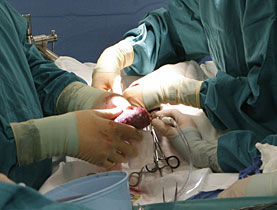To sleep, perchance to remember

The next time you forget a face at a party, the new boss's name or your wife's birthday, you may want to consider sleeping more, Swiss research suggests.
Experts have long known that sleep clarifies the way we think, but neuroscientists at Geneva University have discovered that sleep can produce a lasting impact on how the brain processes and stores newly learnt information.
They say sleep stimulates new brain connections, which strengthen learning processes.
Sophie Schwartz of the Neurology and Imaging of Cognition laboratory at Geneva University told swissinfo that while new experiences were initially encoded in memory, how we sleep can substantially affect what happens from there.
“Our results revealed that a period of sleep following a new experience can consolidate and improve subsequent effects of learning from the experience,” Schwartz said.
The findings, which are unpublished, were presented at this week’s 6th Forum of European Neuroscience in Geneva.
According to Schwartz, when the brain first receives sensory information, it perceives and decodes it in its outer layer, the neocortex.
From there, the information is sent to the hippocampus, located in the front part of the brain and believed to be integral to spatial navigation and short-term memory. The hippocampus acts as a temporary buffer.
The brain then filters out irrelevant information and decides what is important enough to store. If the information makes the cut, it is stored on a more permanent basis. The end result is called declarative memory.
Dialogue
“One idea is that the dialogue between the hippocampus and the cortex – and especially the replay of recently encoded memories – would occur during sleep,” Schwartz said.
“There is no simultaneous information coming from the external world.”
Researchers have consistently pointed to the social, emotional and even economic benefits of getting enough sleep to increasingly tired humans. “We are all sleep-deprived. Journalists probably too,” Schwartz said.
In the Geneva University study she directed, subjects were subjected to new visual stimuli, such as a face or tasks like tracing a moving dot with a joystick. They were then allowed to sleep normally or not.
Scientists compared a whole night of normal sleep with a whole night of sleep deprivation, naps versus no naps, and eight hours of night sleep compared with eight hours of being awake during the day.
“The improvement comes from changes in brain activity in specific regions that code for relevant features of the learnt material,” Schwartz said.
Information bursts
Brain scans of humans and animals have indicated that bursts of information pass between the neocortex and the hippocampus during the first hours of sleep, known as slow wave sleep.
It is during slow wave sleep that the brain remembers declarative or episodic memory – precise facts a person can access consciously.
Our skills – or procedural memory – are encoded during the rapid eye movement sleep, which is more abundant during the latter hours of the night. “When you learn to ride a bike, you don’t know exactly what you do to be successful, and still you improve,” Schwartz said.
The functional distinctions between slow wave sleep and rapid eye movement sleep may explain why some people excel in fact-based disciplines, even on relatively little rest.
“We don’t know how much we need. So it’s possible that in terms of amount, we don’t need so much of some kinds of sleep,” said Schwartz, adding that each person has different abilities and needs.
“We don’t consolidate memories exclusively during sleep. The idea is that sleep may provide some permissive conditions for consolidation to occur, but it’s also possible that there are some people that have better memory skills.”
swissinfo, Justin Häne
There are three steps in memory processing: encoding new information; consolidation; recall.
For those with a habit of misplacing things, the findings will provide little solace. Not remembering, Schwartz says, is different from being absent-minded.
People who misplace things likely never register information about where they put them in the first place. If the information isn’t registered, it can’t be consolidated or recalled.
Declarative memory is the part of human memory that stores facts. It refers to things we have consciously learnt or remembered, such as facts or events.
Procedural memory is the part of our memory that deals with skills or procedures – things we routinely recall, but can’t easily articulate, such as how to ride a bicycle.

In compliance with the JTI standards
More: SWI swissinfo.ch certified by the Journalism Trust Initiative












You can find an overview of ongoing debates with our journalists here . Please join us!
If you want to start a conversation about a topic raised in this article or want to report factual errors, email us at english@swissinfo.ch.